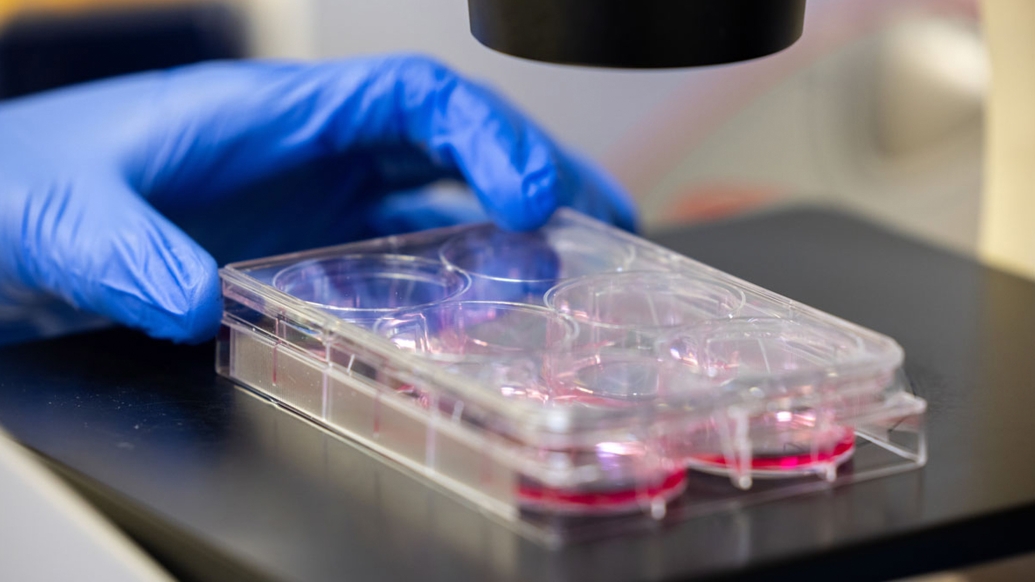By feeding T cells in the lab, researchers revealed a new metabolic pathway that could help make immunology more effective
1:20 PM
Author |

Research from the University of Michigan Rogel Cancer Center reveals that the metabolic pathways that make a specific type of T cell function are different than previously believed. The key to this discovery lies in a new methodology developed by Hanna Hong, graduate student in immunology and first author of this study. The findings appear in Science Immunology.
T cells are critical players of adaptive immunity that protect against infections and cancers. Metabolic pathways produce the energy and building blocks required for them to carry out their jobs. “A T cell’s specific identity and function are ruled by metabolic pathways, so each type of T cell’s inner workings are distinct,” Hong explained.
For this study, Hong developed a type of “cell food” to grow T cells in culture that look and behave like the T cells in an organism.
Previous research from the lab established that the way cells make energy through metabolism inside a living organism is very different from how the field previously modeled metabolism in the lab, a disparity that had led to problems translating previous findings.
This new approach enabled Hong to observe in the lab how different metabolic programs regulate T cell persistence in an organism. Too much T cell persistence equals autoimmunity, or the body misinterpreting and attacking healthy cells as if they were sick cells, and too little persistence means a weakened immune system.
They focused on a specific type of T cell called TH17, which act in the body’s immune response to pathogens.
“Because TH17 cells can have different metabolic pathways, they have the capacity to take on properties of other types of T cells that are associated with autoimmunity and immune suppression,” Hong said. “We’re dedicating more effort to understanding the underlying mechanisms that cause TH17 cells to transition from those that protect against infections to those that promote autoimmunity. Ultimately, the hope is that targeting these pathways can reverse disease.”
“T cells play a critical role in protecting us from various diseases, like infections and cancer. However, if over-active, these same properties can lead to autoimmunity and harm us. A more detailed understanding of what T cells eat and how this fuels their metabolism provides important inroads to harness the power of the immune system without tipping the balance toward autoimmunity,” added Costas Lyssiotis, Ph.D., Maisel Research Professor of Oncology at the Rogel Cancer Center and principal investigator of this study.
Additional authors: Nneka E. Mbah, Mengrou Shan, Kristen Loesel, Lin Lin, Peter Sajjakulnukit, Luis O. Correa, Anthony Andren, Jason Lin, Atsushi Hayashi, Brian Magnuson, Judy Chen, Zhaoheng Li, Yuying Xie, Li Zhang, Daniel R. Goldstein, Shannon A. Carty, Yu Leo Lei, Anthony W. Opipari, Rafael J. Argüello, Ilona Kryczek, Nobuhiko Kamada, Weiping Zou, Luigi Franch, Costas A. Lyssiotis
COI: C.A.L. has received consulting fees from Astellas Pharmaceuticals, Odyssey Therapeutics, and T-Knife Therapeutics and is an inventor on patents pertaining to Kras regulated metabolic pathways, redox control pathways in pancreatic cancer, and targeting the GOT1-pathway as a therapeutic approach (US Patent No: 2015126580-A1, 05/07/2015; US Patent No: 20190136238, 05/09/2019; International Patent No: WO2013177426-A2, 04/23/2015).
A.W.O. and L.F. have ownership interests in First Wave BioPharma and are currently affiliated with Odyssey Therapeutics. N.K. is a member of the WPI Immunology Frontier Research Center at Osaka University, Suita, Japan. All other authors declare no competing interests.
Paper cited: “OXPHOS promotes apoptotic resistance and cellular persistence in TH17 cells in the periphery and tumor microenvironment,” Science Immunology. DOI: 10.1126/sciimmunol.abm81

Explore a variety of health care news & stories by visiting the Health Lab home page for more articles.

Department of Communication at Michigan Medicine
Want top health & research news weekly? Sign up for Health Lab’s newsletters today!





